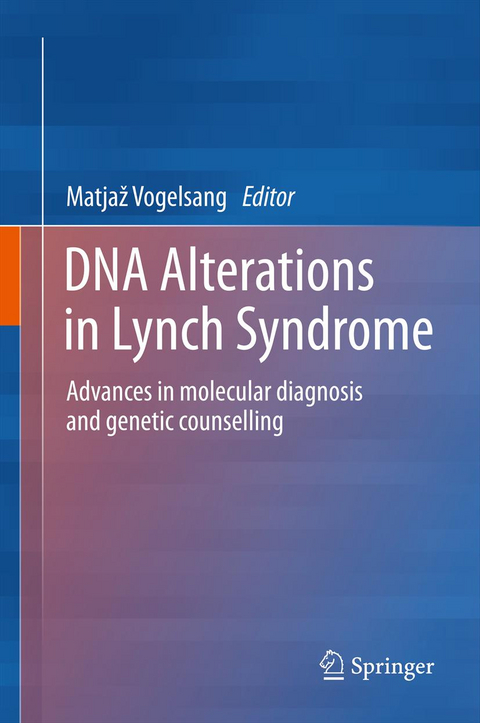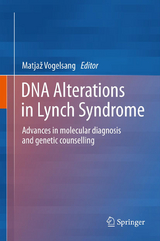DNA Alterations in Lynch Syndrome
Advances in molecular diagnosis and genetic counselling
Seiten
2013
|
2013 ed.
Springer (Verlag)
978-94-007-6596-2 (ISBN)
Springer (Verlag)
978-94-007-6596-2 (ISBN)
Lynch syndrome (LS) is the most common cause of inherited colorectal cancer, a disease with a high mortality rate. Intensive cancer screening, with early initiation and frequent follow-up, can reduce colorectal cancer incidence and mortality in LS patients.
Lynch syndrome (LS) is the most common cause of inherited colorectal cancer, a disease with a high mortality rate. An estimated 37,000 of diagnosed colorectal cancer cases worldwide are attributed to Lynch syndrome each year. Intensive cancer screening, with early initiation and frequent follow-up, can reduce colorectal cancer incidence and mortality in LS patients. This book provides an up-to-date overview on the genetic and epigenetic basis of Lynch syndrome. It evaluates clinical features of the disease and critically comments on molecular tools available for identifying mutations responsible for Lynch syndrome; in addition the importance of functional assays that can help clarify the clinical nature of identified mutations is also discussed. The book also focuses on challenges in genetic counselling of at-risk individuals and discusses related ethical issues. The purpose of the book is to give a concise knowledge base for the broader scientific and medical community, including genetic counselors, in order to improve awareness on the potential impact that the diagnosis of LS has on treatment, management and surveillance of LS patients.
Lynch syndrome (LS) is the most common cause of inherited colorectal cancer, a disease with a high mortality rate. An estimated 37,000 of diagnosed colorectal cancer cases worldwide are attributed to Lynch syndrome each year. Intensive cancer screening, with early initiation and frequent follow-up, can reduce colorectal cancer incidence and mortality in LS patients. This book provides an up-to-date overview on the genetic and epigenetic basis of Lynch syndrome. It evaluates clinical features of the disease and critically comments on molecular tools available for identifying mutations responsible for Lynch syndrome; in addition the importance of functional assays that can help clarify the clinical nature of identified mutations is also discussed. The book also focuses on challenges in genetic counselling of at-risk individuals and discusses related ethical issues. The purpose of the book is to give a concise knowledge base for the broader scientific and medical community, including genetic counselors, in order to improve awareness on the potential impact that the diagnosis of LS has on treatment, management and surveillance of LS patients.
Preface.- Historical Development of Lynch Syndrome.- Molecular Mechanisms and Functions of DNA Mismatch Repair.- New Insights into Lynch Syndrome Diagnosis.- Genetic Testing, an Optimal Strategy for Lynch Syndrome Identification.- Functional Analyses Help to Assess the Pathogenicity of MMR Gene Variants of Uncertain Significance.- The Role of Epimutations of the Mismatch Repair Genes in the Development of Lynch Syndrome Related Cancers.- Mutations in non-MMR Genes Modifying or Mimicking Lynch Syndrome Phenotype.- Lynch Syndrome: Genetic Counselling of at-risk Individuals and Families.- Index.
| Zusatzinfo | X, 195 p. |
|---|---|
| Verlagsort | Dordrecht |
| Sprache | englisch |
| Maße | 155 x 235 mm |
| Themenwelt | Medizinische Fachgebiete ► Innere Medizin ► Gastroenterologie |
| Medizin / Pharmazie ► Medizinische Fachgebiete ► Onkologie | |
| Studium ► 2. Studienabschnitt (Klinik) ► Humangenetik | |
| Schlagworte | DNA mismatch repair • DNS (Desoxyribonukleinsäure) • ethics • Genetic counselling • Hereditary nonpolyposis colorectal cancer • Lynch syndrome |
| ISBN-10 | 94-007-6596-7 / 9400765967 |
| ISBN-13 | 978-94-007-6596-2 / 9789400765962 |
| Zustand | Neuware |
| Haben Sie eine Frage zum Produkt? |
Mehr entdecken
aus dem Bereich
aus dem Bereich
Buch | Softcover (2024)
Urban & Fischer in Elsevier (Verlag)
CHF 76,00




